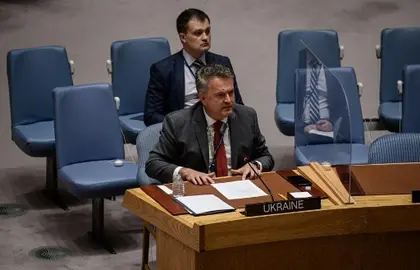Ukraine’s Permanent Representative to the UN, Serhiy Kyslytsya, said at a meeting of the UN Security Council that the Russian delegation tried to put pressure on International Atomic Energy Agency Director-General Rafael Grossi when his team was preparing a report on the situation at the Zaporizhzhia NPP.
On Tuesday, September 6, the UN Security Council, at Russia’s request, met for the third time in two months to consider the situation at the Zaporizhzhia nuclear power plant, which has been occupied by Russian forces since the beginning of March.
JOIN US ON TELEGRAM
Follow our coverage of the war on the @Kyivpost_official.
At this meeting, Ukrinform reports, Russia’s Permanent Representative, Vasil Nebenzya, expressed his dissatisfaction with the IAEA report. Allegedly he protested against the fact that it recorded the presence of Russian troops and military equipment at the plant. Nebenzya demanded that Grossi clarify what kind of military equipment he saw there, before attempting to convince members of the Security Council that it was not there at all. At the same time, the Russian diplomat said he did not have time to study the report in detail.
“It is interesting to see how the Russian envoy whines that he did not have enough time to properly study the published IAEA report, as if it was not Russia itself that so urgently called this meeting (of the UN Security Council),” Kyslytsya noted.
According to him, “the only thing that explains this Russian fuss is an attempt to put pressure on IAEA Director-General Grossi and his team while they were still preparing the report.”

‘We Need to End that Horrible, Horrible War’ – Ukraine at War Update for Dec. 23
When this plan failed and the document was published before the Security Council meeting, “the Russian envoy desperately tried to manipulate the report, which, as he himself admitted, he did not have enough time to study,” Kyslytsya explained.
Giving his advice to the representative of the Russian Federation, he said: “next time, be patient, do not fuss, unless we are discussing the withdrawal of the Russian army from Ukraine.”
The IAEA had earlier published a report on the results of its visit to the Zaporizhzhia nuclear power plant, in which it noted constant shelling as a threat to nuclear safety.
The report also stressed that the attacks could have affected security-related structures, systems, and components, and could have had a significant impact on safety, loss of life, or injury to the plant’s employees. Grossi said that although the shelling had not caused a nuclear emergency yet, it was a constant threat to nuclear safety.
You can also highlight the text and press Ctrl + Enter






